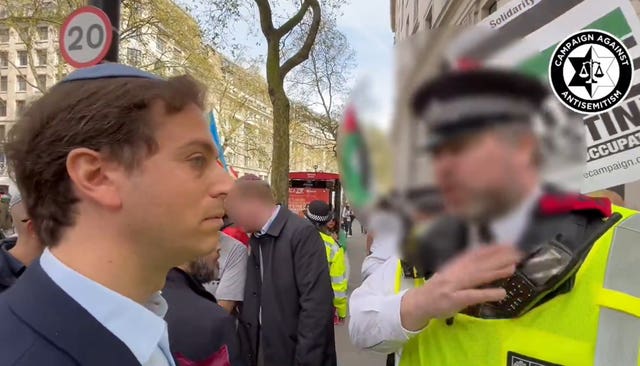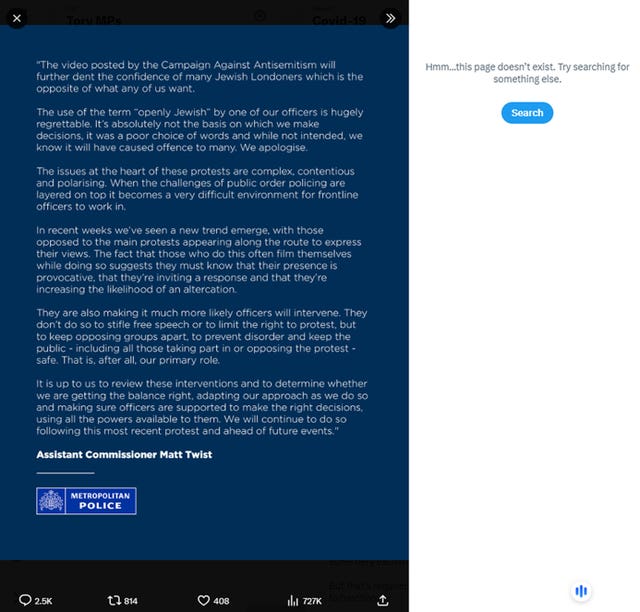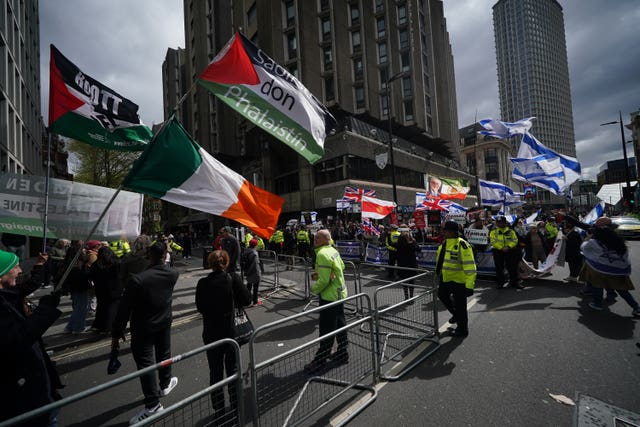Policing minister to meet Met Commissioner after protest row
The force has been criticised after an officer described an antisemitism campaigner as ‘openly Jewish’ and threatened him with arrest.

The policing minister has said he will meet Metropolitan Police Commissioner Sir Mark Rowley to discuss concerns after an officer described an antisemitism campaigner as “openly Jewish”.
Campaign Against Antisemitism chief executive Gideon Falter was threatened with arrest near a pro-Palestine protest in central London on April 13.
A video clip showed an officer telling Mr Falter: “You are quite openly Jewish, this is a pro-Palestinian march. I’m not accusing you of anything but I’m worried about the reaction to your presence.”
Mr Falter had been wearing a kippah skull cap when he was prevented from crossing the road near the demonstration in the Aldwych area of London.

But the force subsequently issued another statement apologising for the “further offence” caused by its first apology.
Policing minister Chris Philp said on Saturday he was “deeply concerned” and would meet Metropolitan Police Commissioner Sir Mark Rowley the following week to discuss the incident.
He said: “No-one should be told their religion is provocative, nor an innocent person threatened with arrest solely because of someone else’s anticipated unreasonable reaction.”
“Anyone of any religion should be free to go about their lives and feel safe doing so.”
It is understood that James Cleverly, the Home Secretary, has written to both the Met and London Mayor Sadiq Khan about the incident.

“The way the original incident was dealt with by the Met was concerning and the original response put out by them was insensitive and wrong.
“The Met have an extremely difficult job – particularly so when it comes to operational decisions taken while policing marches – but in the end the Met must have the confidence of the communities they serve and it is right that they have apologised for the way the incident was handled and their original public response.”
Mr Falter said he had been walking in the capital after attending synagogue and was not there to counter-protest.
In the clip, another officer said to him: “There’s a unit of people here now.
“You will be escorted out of this area so you can go about your business, go where you want freely, or if you choose to remain here because you are causing a breach of peace with all these other people, you will be arrested.”
The officer said that Mr Falter’s presence was “antagonising”.
“Instead of addressing that threat of antisemitic violence, the Met’s policy instead seems to be that law-abiding Jewish Londoners should not be in the parts of London where these marches are taking place.
“In other words, that they are no-go zones for Jews.”

On Saturday, two rival protests took place alongside each other in Tottenham Court Road, central London – one pro-Israel and one pro-Palestine.
The Met has faced criticism for its handling of a series of pro-Palestinian demonstrations since the renewal of hostilities in Gaza last October.
Last month, the Prime Minister said the public wanted to see officers “not merely manage these protests, but police them”, while his former home secretary, Suella Braverman, said the Jewish community had been “let down by the authorities”, during a Commons debate in February.





